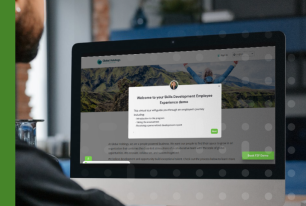Five Expectations of Your Current and Future Workforce: Adapt or Fail
As organizations look for a fast start to the new year, employee activation is top of mind for many HR teams. With a growing Gen Z workforce and evolving demands in their career, life, and the technology they use, it is important to meet these five expectations to engage, retain and enable your employees to thrive.
Share
1. Keep Us Growing or We’ll Keep Moving
We are beyond the era of a ‘job for life’, job-hopping is now a common occurrence, with Gen Z workers averaging just over two years at a company. What does this mean for organizations that are looking to invest in their workforce? A culture that activates employees so they are invested in the success of the business, believe they are contributing to success and have a pathway to grow and develop, will improve both performance and retention. Understanding the motivations of your workforce can help put in place the right processes and skills development plans to enable your workforce to grow, develop and progress.
2. Value Our Humanity: We’re More Than Skills AI Can Replicate
The past year has seen AI promoted to the forefront of every business, whether deciding how best to embrace AI, understanding the impact on your teams, or the effect on talent decision-making.
One thing is clear, employees want their roles to become about their human skills—empathy, creativity, adaptability, and critical thinking. As automation starts to take over the more mundane, data-oriented, and repetitive task-based processes, human skills are becoming increasingly valuable. Organizations needs to be able to clearly identify the strengths and areas for growth by understanding what these human skills mean for roles, tasks, and business goals. Objective talent assessments can provide these insights by uncovering skills that employees may not realize they have, and guide development initiatives to help them progress in the business.
3. Make Fairness Visible: We Need to Trust How Decisions Are Made
Workers now expect fairness and transparency when it comes to any decision regarding their employment, development, or movement within an organization. Over half of U.S. workers consider a company’s commitment to DEI crucial when choosing an employer. With this comes trust in the business and a culture where employees from all backgrounds feel included, engaged, and respected. From objective talent assessments, through to interviewing with fairness, and carrying this transparency through to talent management decisions, organizations can establish fair and reliable processes to build long-term trust amongst the workforce.
4. Help Us Adapt: Change Is Constant, and We Need Support
The modern workplace is characterized by constant, rapid change, creating significant challenges for employees. A staggering 73% of workers report moderate to high stress levels due to frequent organizational transformations. The continuous nature of these changes is overwhelming, with employees feeling perpetually unsettled and may look elsewhere for stability. Those who remain often become disengaged and risk burnout, struggling to adapt to the relentless pace of change.
To address change fatigue, organizations must prioritize employee empowerment. Creating an environment that helps workers feel in control, rather than simply reacting to changes, is crucial for maintaining workforce morale, productivity, and retention. Skills-based audits are one way to gain insights into readiness for transformation and see who can be your ‘change champions’ and where to develop those skills needed to master business transformation.
5. Equip Us for the Future: We Want to Evolve with AI
AI is rapidly transforming the job landscape across industries, with LinkedIn research showing that 68% of the fastest-growing U.S. job roles didn't exist two decades ago. However, only just over a third of companies provide AI literacy training, creating a significant skills gap. This misalignment poses risks as roles evolve and new responsibilities emerge. To thrive, employees need clear training on responsible AI to avoid misuse and ineffective outcomes. By investing in AI tools and training, organizations can empower employees to stay agile, relevant, and productive, while also keeping teams inspired and prepared for future job demands.
Interested in learning more?
Attend our webinar, Stay Ahead in 2025: Meeting the Evolving Expectations of Future Workforce for actionable insights to align your people strategies with evolving workforce expectations—positioning your organization to stay competitive, innovative, and employee-focused.
- Americas: January 15 | Register Now
- EMEA: January 16 | Register Now
- Asia: January 21 | Register Now
- India: January 23 | Register Now
- ANZ: February 20 | Register Now









